PHOTO ESSAY
Life and death in the shadow of Mpumalanga’s toxic coal mines
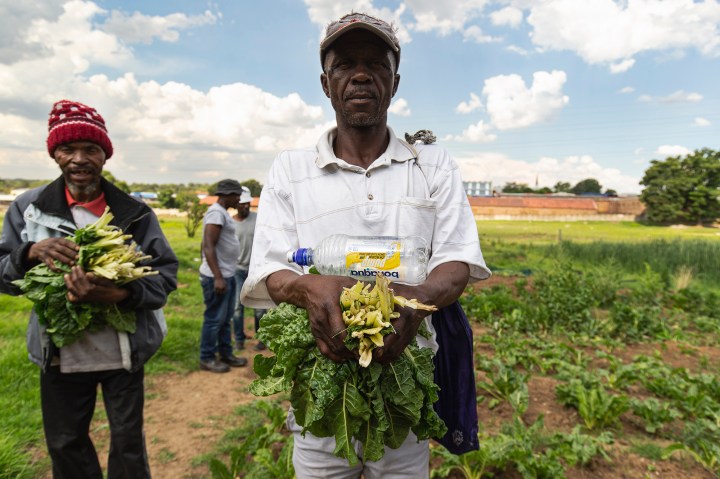
Austrian photographer Stefan Kleinowitz spent time with communities living under the toxic cloud of coal mining around eMalahleni (formerly Witbank) in Mpumalanga, documenting their daily lives. His stark images spell out their hardscrabble battle for a decent life.
When I first heard that South Africa is heavily dependent on coal to produce energy I became curious. I found a report from Greenpeace Africa that confirmed my suspicion: “In autumn 2018, an evaluation of comparative satellite data showed that no other region in the world was more heavily contaminated by nitrogen dioxide.”
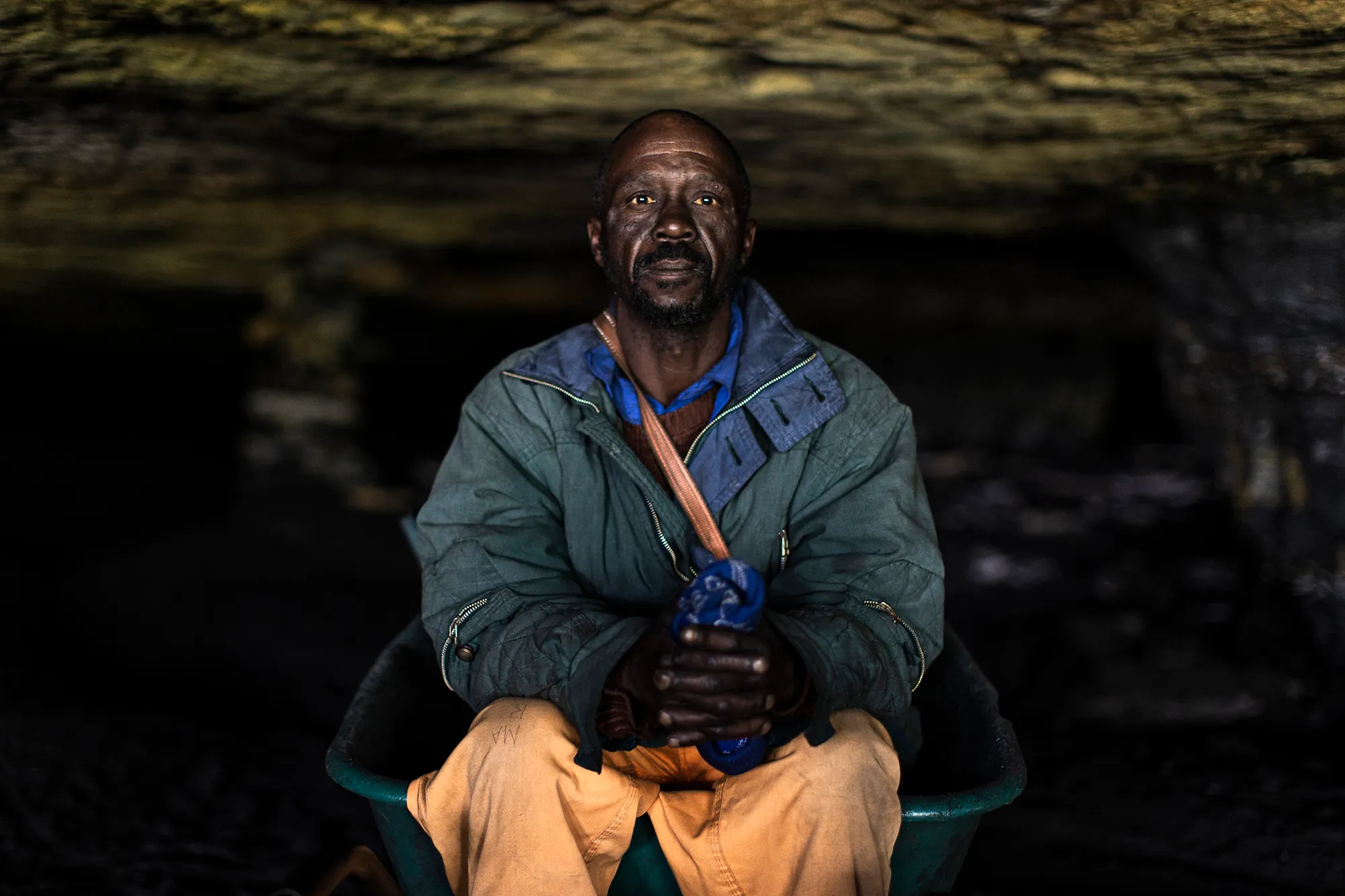
Mr Mabuza (61) sits on a wheelbarrow at the entrance of the Ting Dong coal mine shaft, the largest artisanal coal mine in Ermelo. Mr Mabuza and his business partner — the owner of the mine — were the first to start artisanal mining in Ermelo in 2008. A knowledgeable and experienced miner, he is the security manager in the Ting Dong mine and plans the day and night shifts of nearly 1,000 Zamazamas. (Photo: Stefan Kleinowitz)
The report stated that each year thousands of South Africans died from the consequences of coal. So I travelled to eMalahleni (formerly Witbank) in Mpumalanga to get a feeling for the situation. I visited a local clinic in Ackerville and a Sunday church service in Vosman. I was lucky to meet people who wanted to tell me their stories. I stayed in small hotels inside the townships and frequently met up with people who were affected by air pollution. One nurse who works at the local clinic in Ackerville was particularly helpful and introduced me to people who suffer from respiratory diseases.
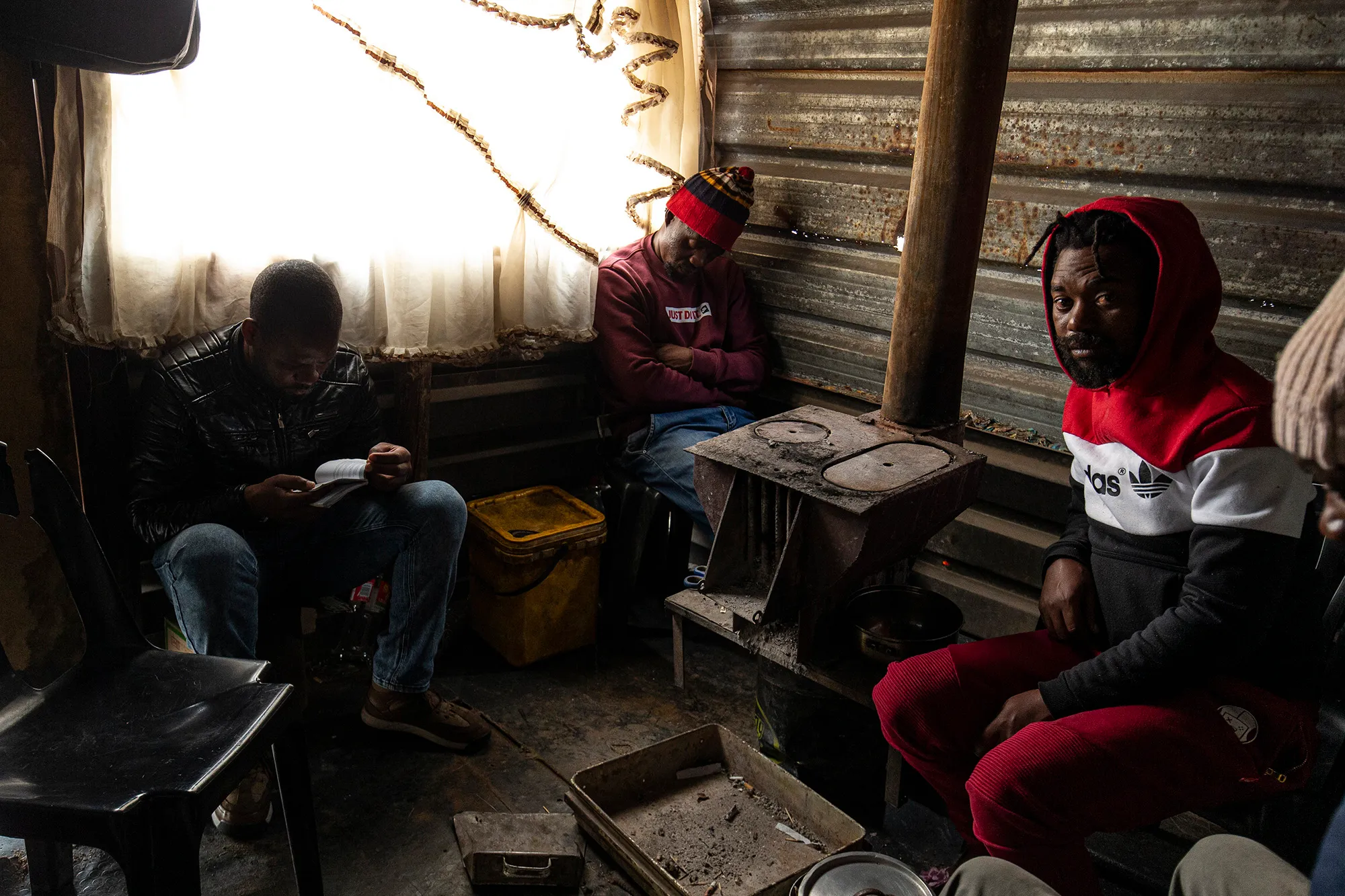
Community activists and members of the Khuthala Environmental Care Group meet at a friend’s house. They argue that the government has only given them empty promises and that they do not receive any support in their fight for a safer and cleaner environment. The group rehabilitates and cleans abandoned mines and waste-dumps, plans workshops for informal miners to educate them about the importance of climate change, creates vegetable gardening projects and supports unemployed people with food parcels and the creation of sustainable jobs outside the coal mining industry. Instead of waiting for government support, the township community is taking matters into their own hands. (Photo: Stefan Kleinowitz)
The Khuthala Environmental Care Group in Ermelo introduced me to their environmental projects and to artisanal miners. Since toxic air pollution in Mpumalanga not only has irreversible long-term effects on the province but also contributes to the global climate crisis, I decided to commit to this story and spend more time in these township communities.
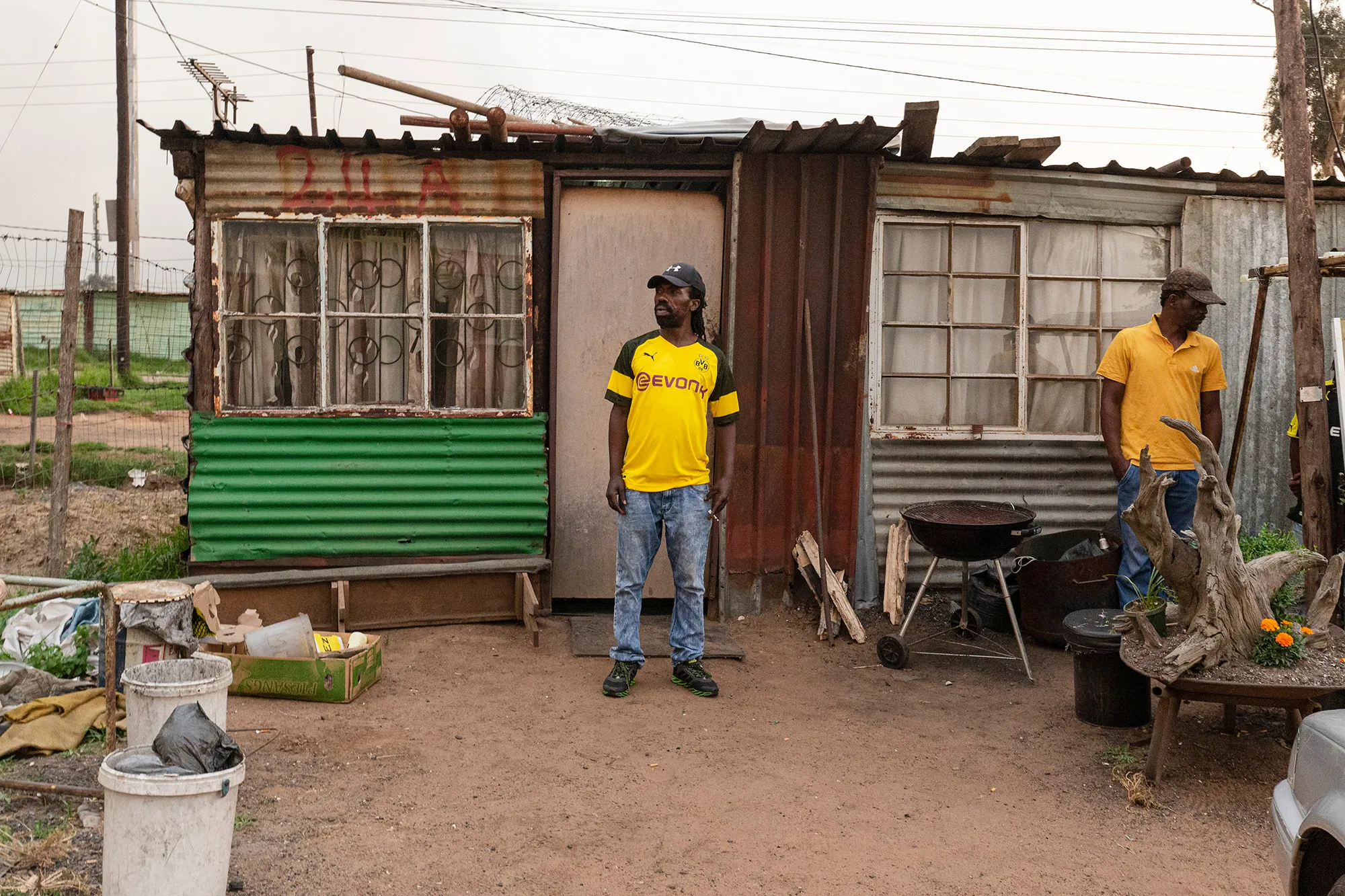
Philan Mngomezulu (45), a co-founder of the Khuthala Environmental Care Group, stands in front of his squatter house. His home doesn’t have running water or sanitation. Like millions of township residents, Mngomezulu cooks and heats his home with coal and firewood. (Photo: Stefan Kleinowitz)
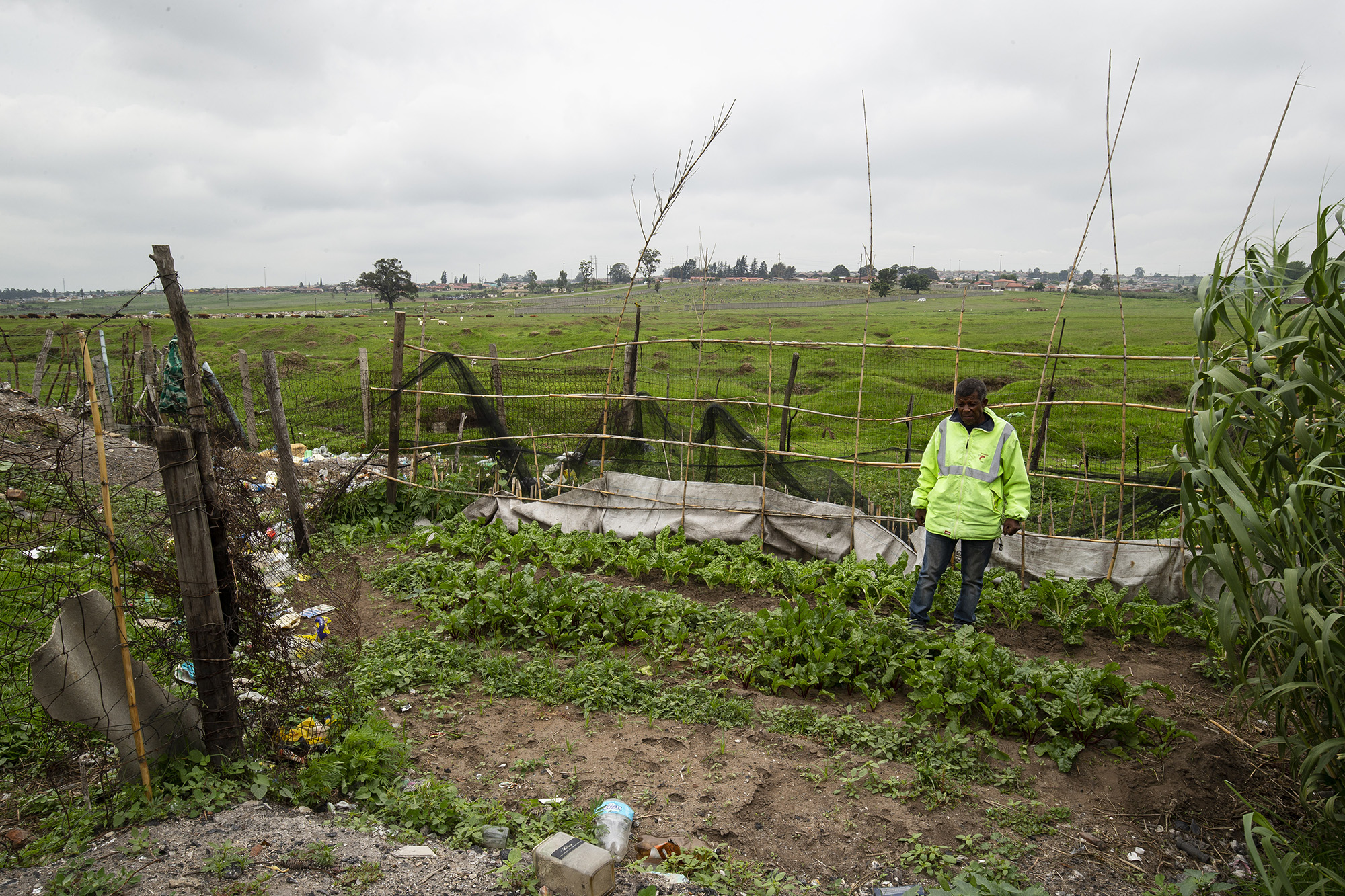
Mpela Mabizela (70) stands on one of his vegetable gardens, which used to be a coal mine dump. Mr Mpela is the leader of local farmers and a chairperson of the ADC (Agricultural Development Committee). The land behind him is scattered with abandoned coal mines and one poisoned stream. Mr Mpela’s role in the community is to give land to locals who want to start farming. All of these activities are neglected and unsupported by the SA government. There is no water supply, electricity or other tools to rehabilitate the land and farm successfully. (Photo: Stefan Kleinowitz)
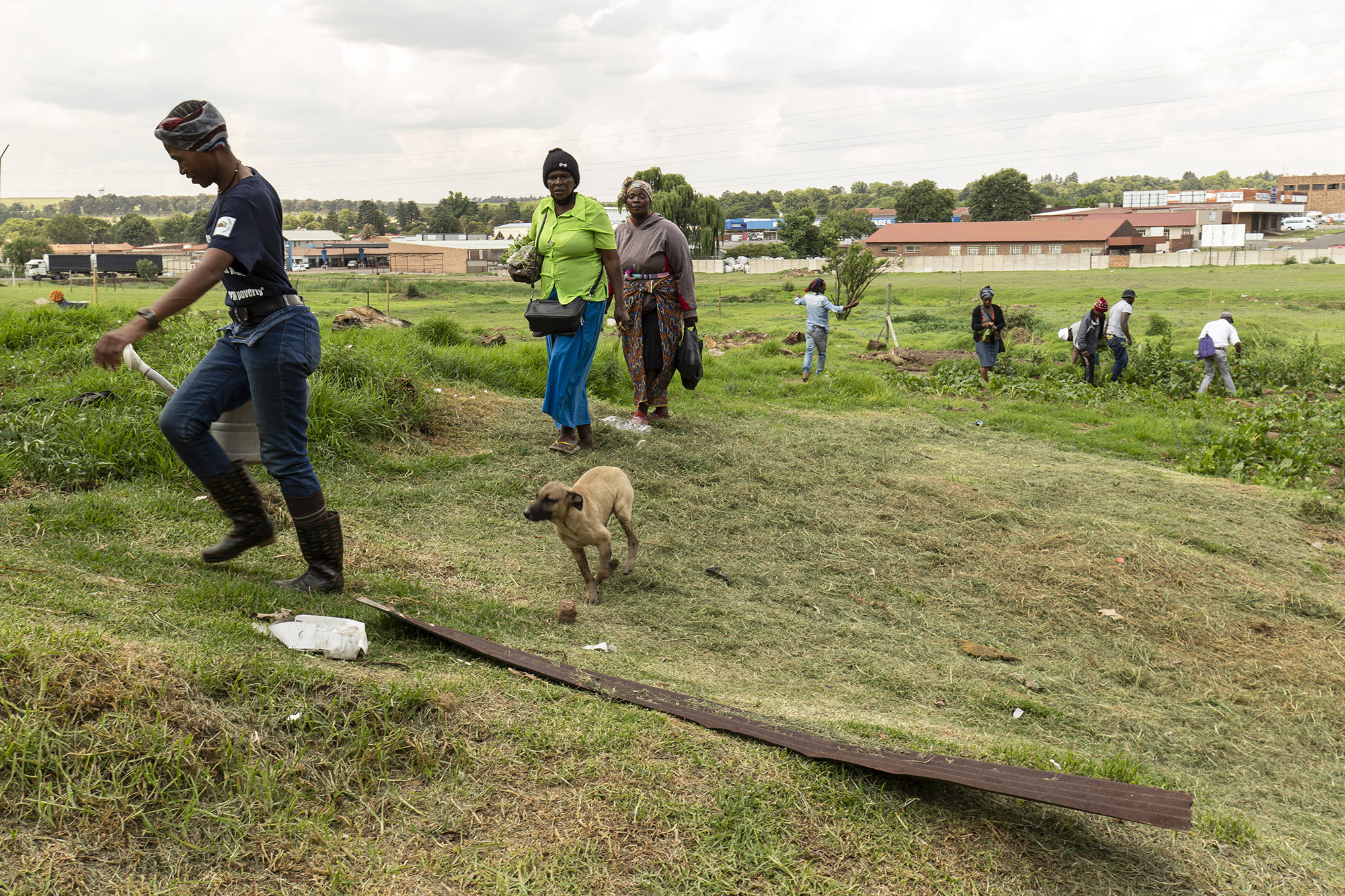
Community activists and members of the Khuthala Environmental Care Group collect fresh vegetables and water their gardens. They argue that the SA government has so far not delivered on its promises and that they do not receive any kind of support. The group rehabilitates abandoned coal mines and waste-dumps, delivers workshops to informal miners to educate them about the importance of air pollution and climate change, creates vegetable gardening projects and supports local unemployed people with the creation of sustainable farming jobs outside the coal mining industry. (Photo: Stefan Kleinowitz)
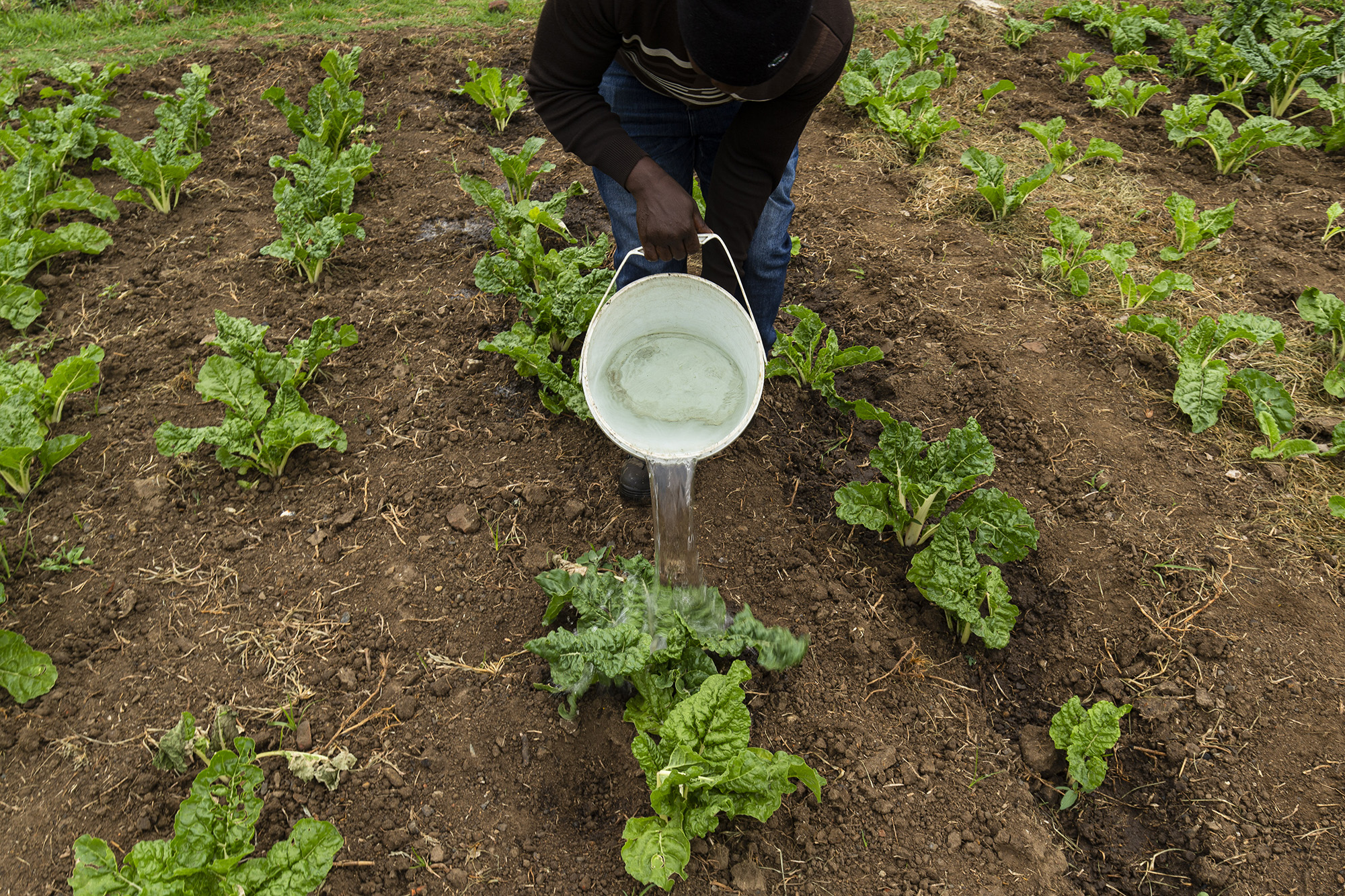
Given Zuli (35), a member and spokesperson of the Khuthala Environmental Care Group, waters the self-cultivated spinach. The Khuthala activists have created a gardening project that supports the wider community. They clean and rehabilitate abandoned coal mines and waste dumps to transform them into vegetable gardens, children’s playgrounds and leisure parks. All their work is self-motivated and unpaid. The South African government has so far not supported activities for a cleaner and healthier environment. (Photo: Stefan Kleinowitz)
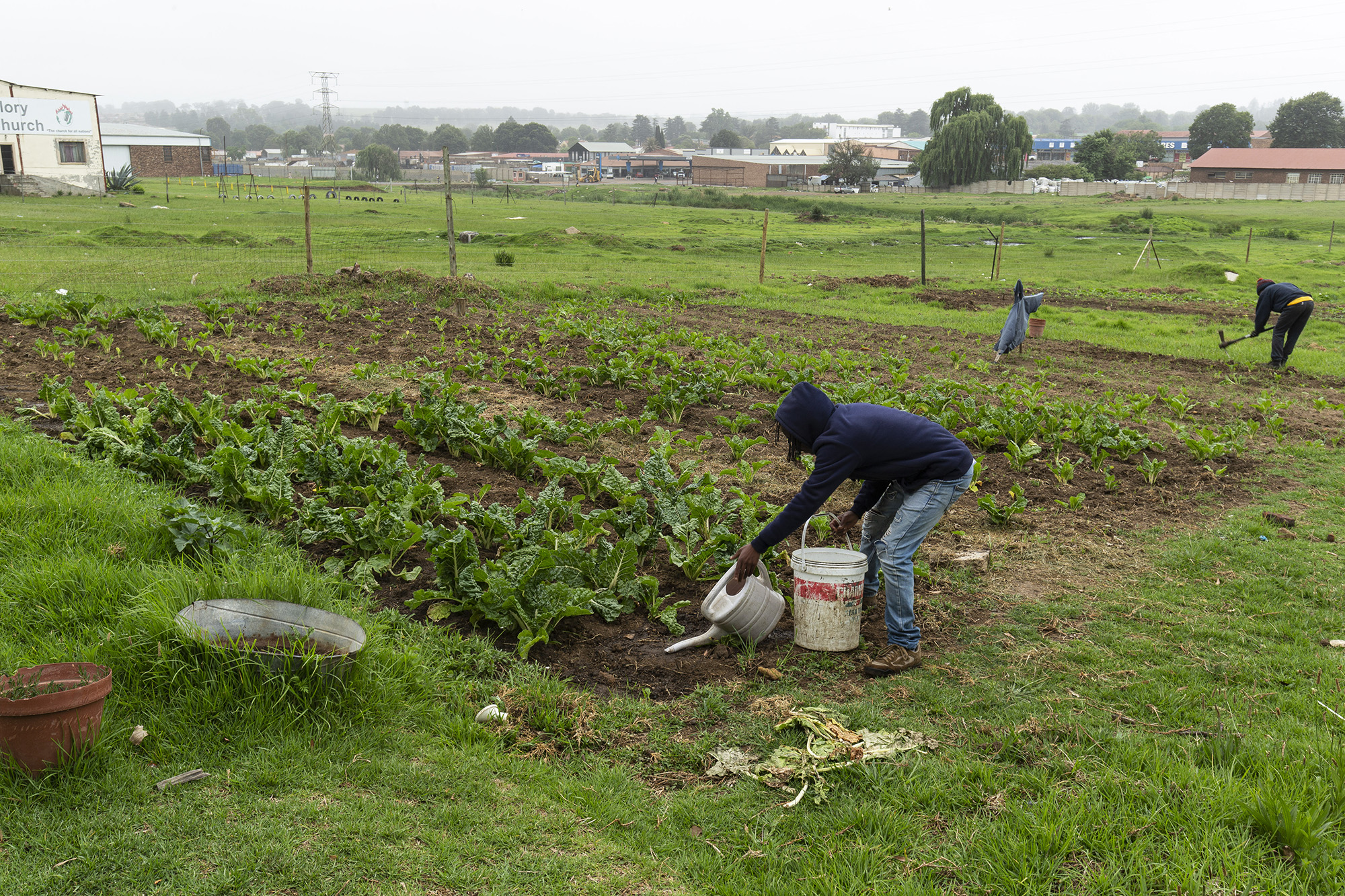
Zethu Hlatshwayo (37) and Philan Mngomezulu (45), the founders of the Khuthala Environmental Care Group, water self-cultivated vegetables. The Khuthala activists have created a gardening project that supports the wider community. (Photo: Stefan Kleinowitz)
Vosman and Ackerville: Two large neighbouring township communities that suffer from severe air pollution. People I met expressed anger and frustration over poverty, unemployment, poisoned water, polluted air, bad health and premature death. Local clinics are understaffed and often do not have clean water for medical personnel and sick patients. The health system in eMalahleni is collapsing.
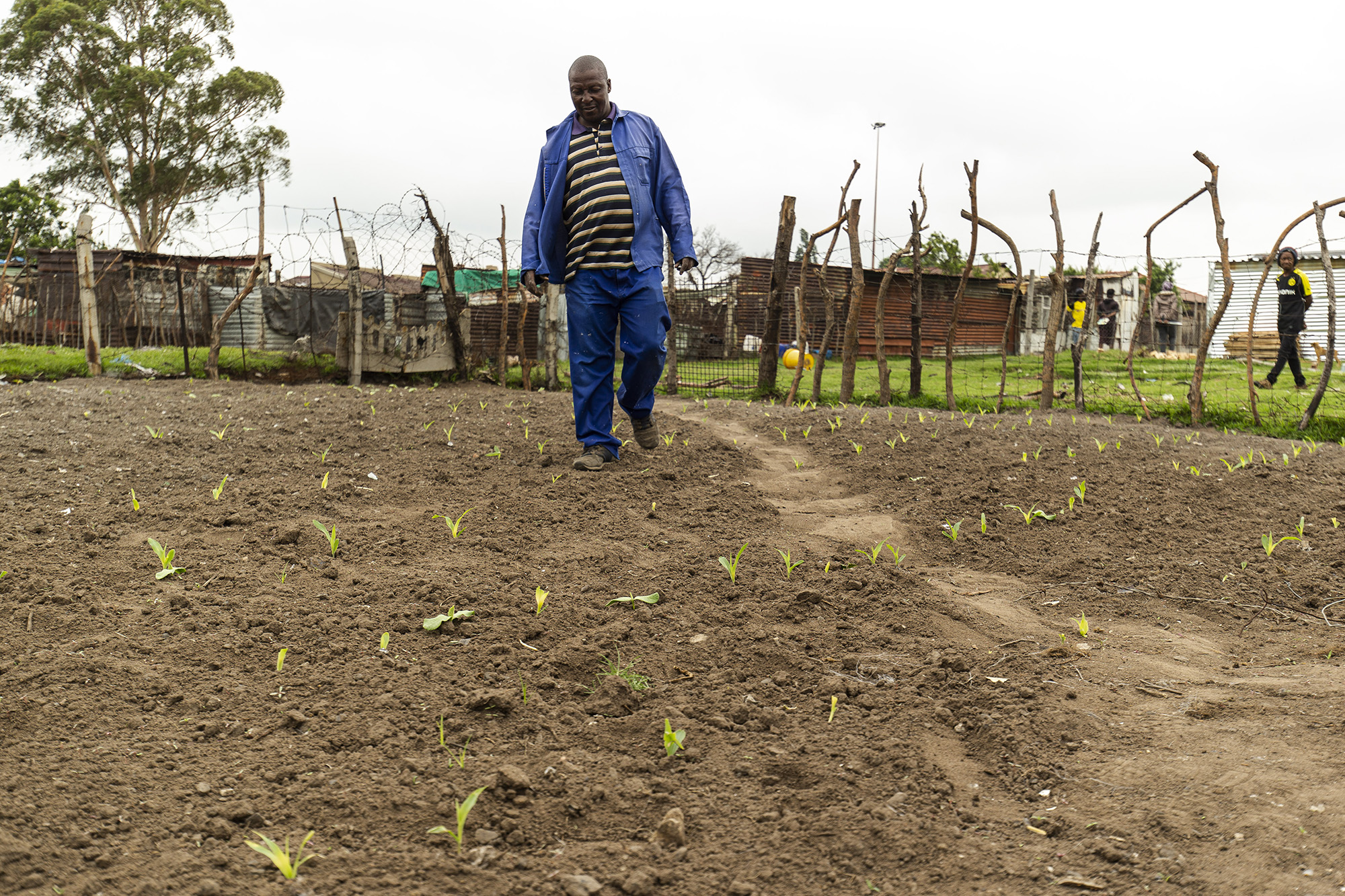
Mr Madonsela (50) inspects the plot on which he farms maize. Where vegetables grow today there used to be a dumping site. He cleaned the land with the help of the Khuthala Environmental Care Group. Instead of waiting for government support, township communities are taking matters in their own hands. (Photo: Stefan Kleinowitz)
Ermelo: The land is pierced by abandoned coal mines where small-scale miners operate. Accidents happen frequently and miners as young as 16 work deep under the earth. For them, artisanal mining is the only way to benefit from coal. The unemployment rate is around 70%.
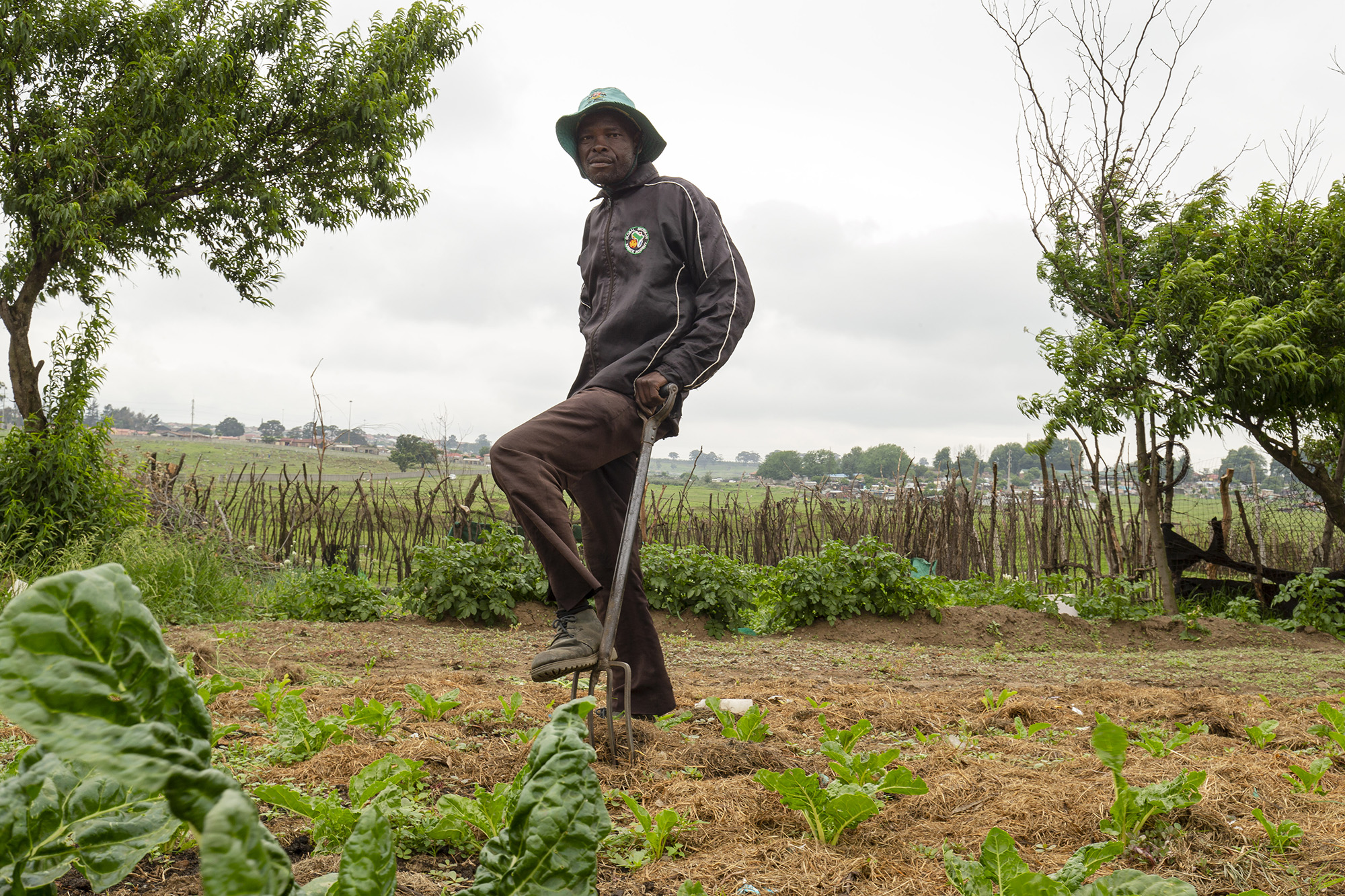
Mncedisi Shaka (45) stands in his vegetable garden where he grows spinach, potatoes, butternut and cabbages. The land was once a waste and dumping site. He cleaned the land with the help of the Khuthala Environmental Care Group. The only water source to water the farm is a poisoned stream. Mncedisi is a member of the Agricultural Development Committee and regularly donates fresh veggies to poor residents. (Photo: Stefan Kleinowitz)

David Mngomezulu (48) stands with his daughter on a small garden plot behind his corrugated iron house. Since the previous coal mine degraded the land and left it unrehabilitated, the community decided to resolve the problem. They stopped the creation of new coal mines in the area and with the support of the Khuthala Environmental Care Group, and started Agri village — a farming community. Instead of coal mines, the community creates vegetable gardens. (Photo: Stefan Kleinowitz)
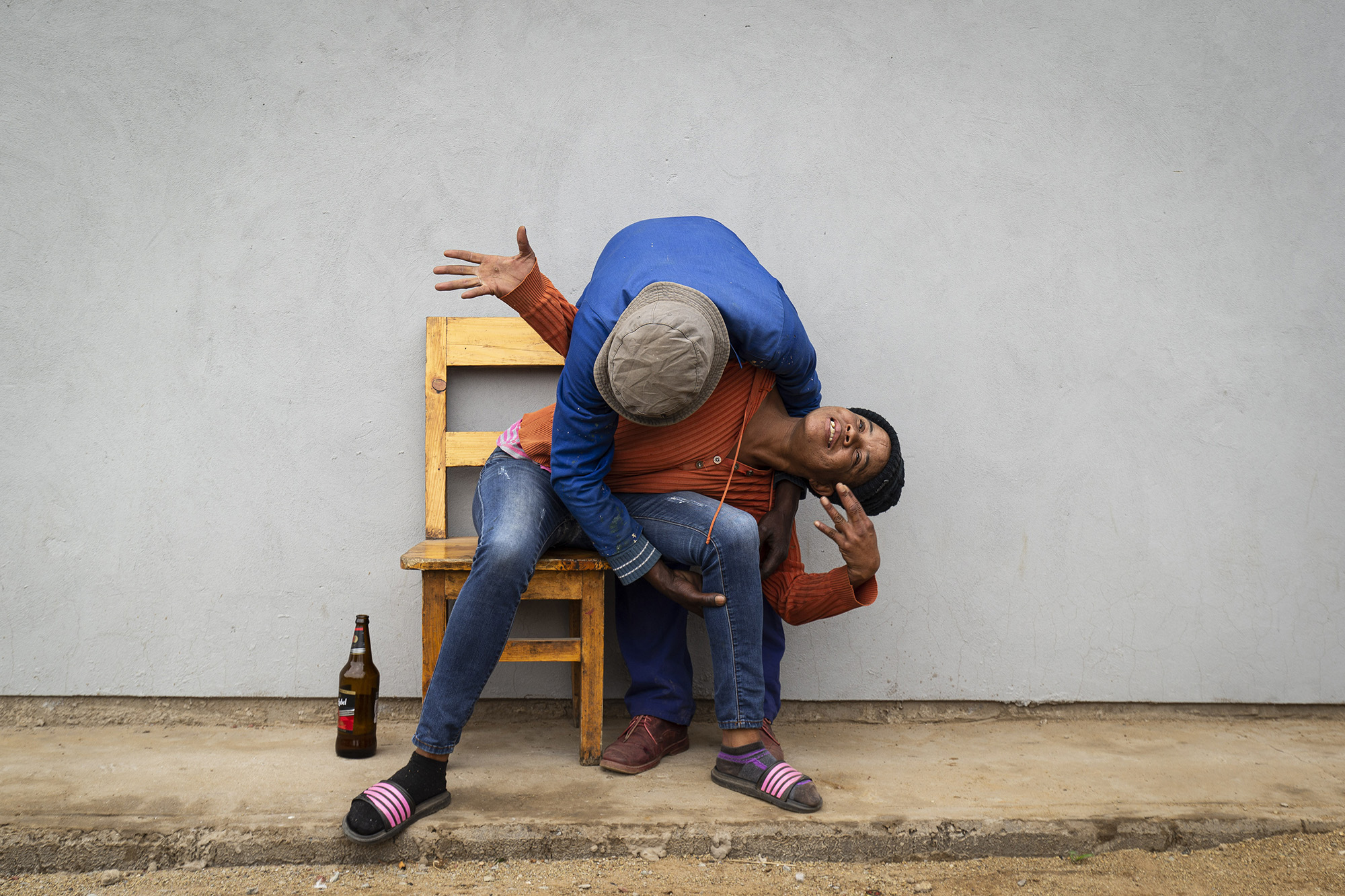
Nobomi (38) drinks Black Label with one of her regular customers. She sells firewood and runs a small tavern selling beer. Poverty, alcohol consumption and unemployment are rife in the townships of Witbank. Government promises such as better housing, jobs, higher minimum wages and rehabilitation of the land have all been unfulfilled. (Photo: Stefan Kleinowitz)
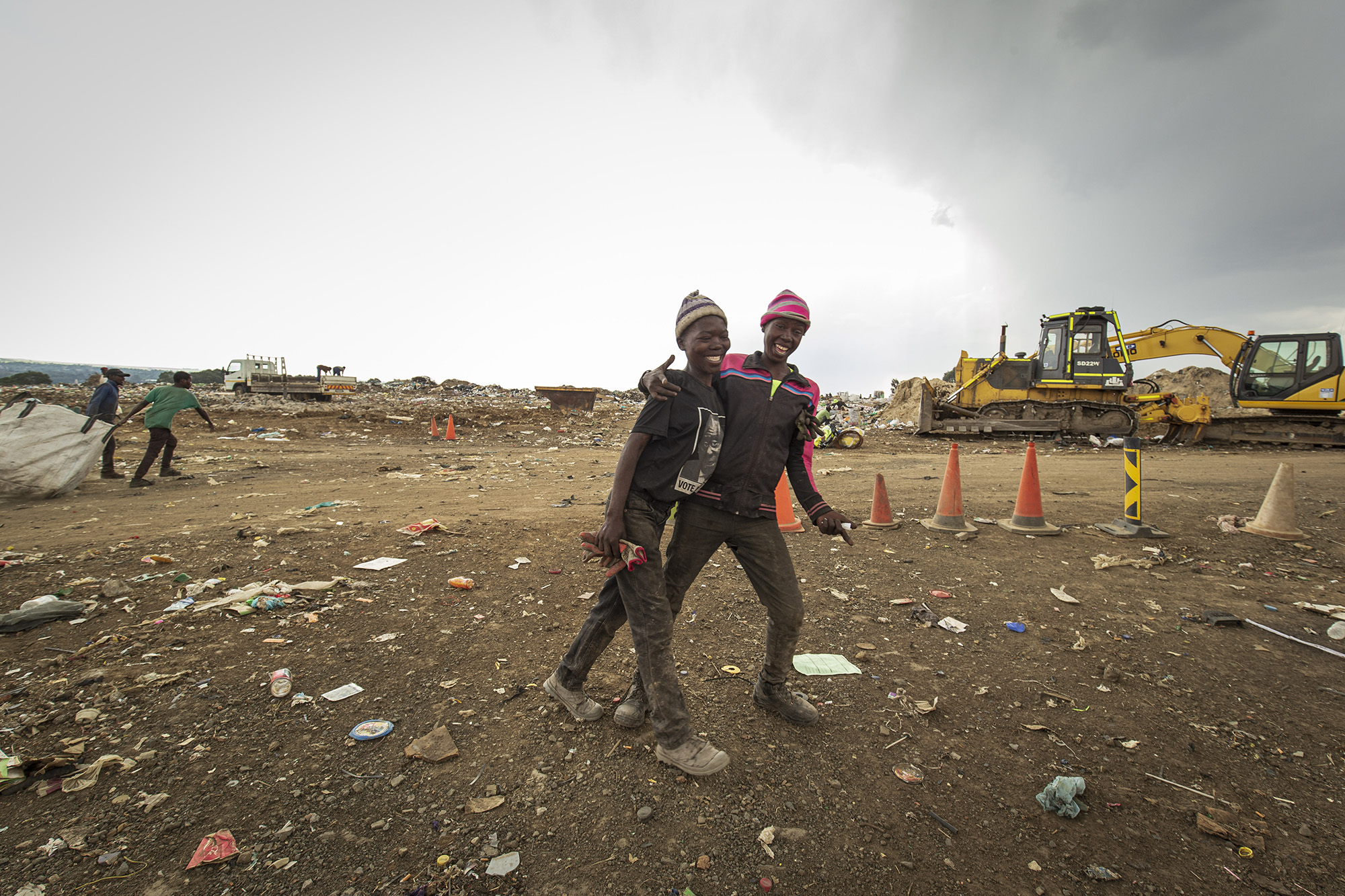
Girls who work as waste pickers embrace after a long day of work. Township communities have not received government support to clean the land. There is no running water, sanitation, or electricity on the dumping site. Also, professional tools to weigh and resell plastic and to separate the waste have not been made available. The average income is as low as R15 an hour. (Photo: Stefan Kleinowitz)
The government appears to only pay lip service to promoting renewable energy. Promised socioeconomic development plans are non-starters. So community leaders and activists have started to organise themselves. They clean abandoned waste and coal mine dumps and create fenced vegetable gardens to support poor township communities. DM
Stefan Kleinowitz grew up in Vienna. He travelled before studying sociology and cultural anthropology. In 2013, he left London Imperial College with a master’s degree in public health and epidemiology. It was his love for photography that helped him find his life’s purpose. He developed his skills at the Arts University of Bournemouth. His work has been published in Der Spiegel, The Washington Post, The New York Times, GEO (Germany), The Guardian (UK), BBC (UK), The Financial Times (UK), Society Magazine (France), SoFoot – Soccer Magazine (France) and BJP – British Journal of Photography;. He has done freelance work for wire agencies.










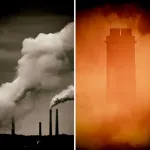








 Become an Insider
Become an Insider
This reflex poverty throughout SA. I’m not sure what coal mining has to do with it.
The photographer attempted to address what? According to the heading it has to do with the hazards of coal mining. Did he come up with the heading or did DM?
The pics do not reflect his topic very well. There is hardly a photo of a ‘toxic’ coal mine. What about the power stations in the area, the environmental impact of especially open cast coal mines, the accompanying pollution, and then of course the fact that the poor quality of air does not only affect people living in illegal shacks under power lines, but also the people in affluent suburbs as well?
The ‘Photo essay’ does not strike me as something one can build a career on. It certainly is not great and it is somewhat surprising that DM – with its otherwise high standards – has decided to publish it.
The text is vague and drags in a number of societal ailments under the ‘toxic coal mine’ concept. Would it be unfair to expect more from someone with a masters degree in public health? It appears the photographer tried his best to focus on controversial topics of which he has no clear concept of in order to grab some attention.